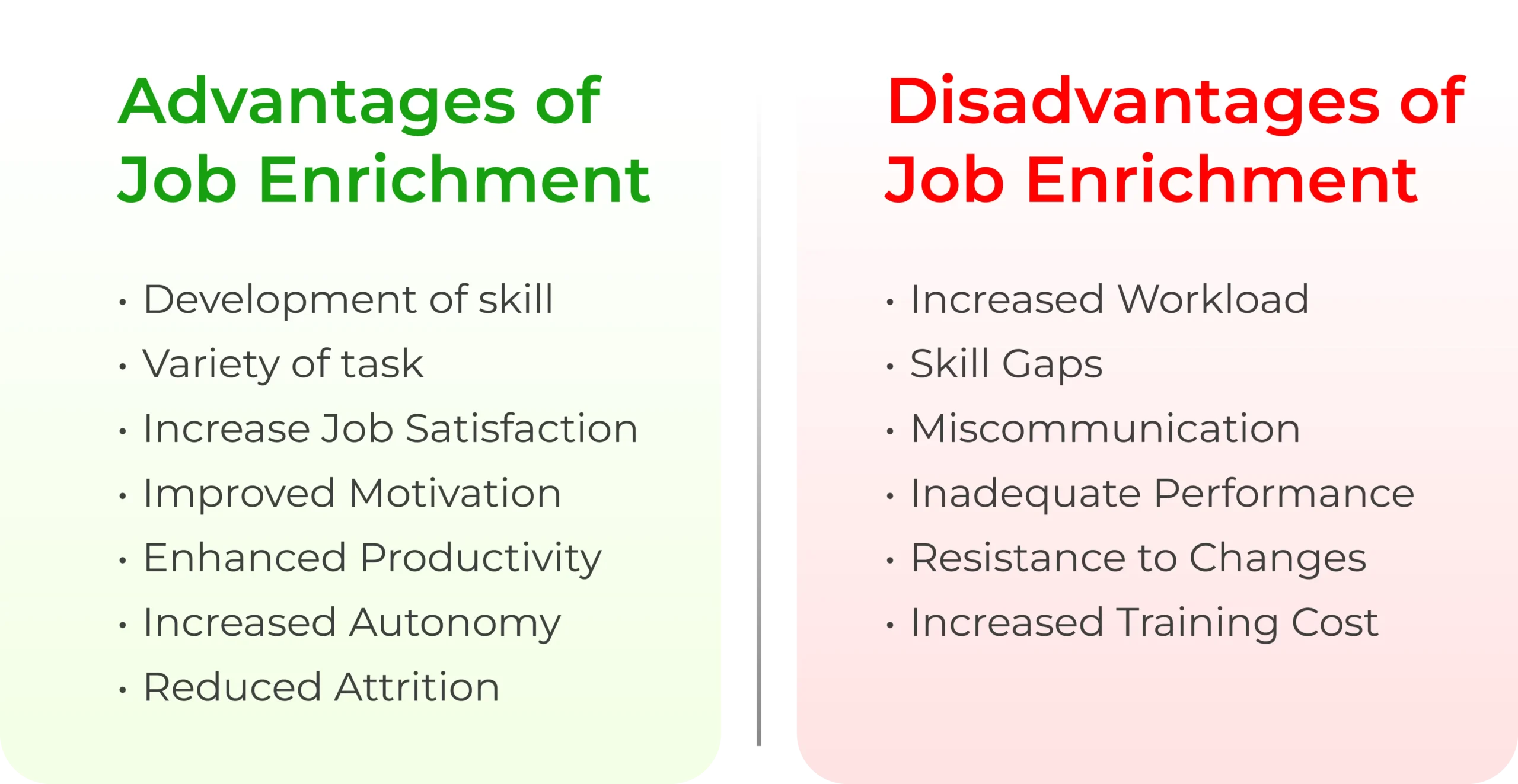Job enrichment is one of the best options to boost employee engagement and productivity in your organization. With the changing dynamics of workplaces in recent years, job enrichment has become a unique tool in the HR arsenal to ensure job satisfaction among staff members.
While job enrichment can be beneficial to your organization, it comes with its share of issues. Hence, you should take adequate precautions before implementing job enrichment strategies in your company.
That is why we are sharing this comprehensive guide with you. While enriching your jobs has its benefits, there are multiple disadvantages to it too. Hence, we urge you to go through this guide and understand all aspects of job enrichment before implementing it in your company.
What is Job Enrichment?
Job enrichment is the practice of enhancing a job by adding more responsibilities and autonomy for the employees to undertake their tasks. It motivates the employees to stay engaged with their job and company, as it includes their upskilling as well as helping them have a greater sense of purpose and achievement.
Consider this job enrichment example: if an employee is good at training others with their work, you can share the idea of letting them mentor others officially. Similarly, if you realize that an employee can work without constant supervision, you can provide them with more authority and responsibilities, which will also boost their morale.
What is the Job Enrichment Theory?
The concept of job enrichment was developed by Frederick Herzberg in 1968 when he conducted the experiment that resulted in the development of the ‘Two-Factor Theory’ or the ‘Motivation-Hygiene Theory’. According to this theory, the two factors are motivation and hygiene, and they are correlated to job satisfaction and dissatisfaction respectively.
The motivational factors enhance an employee’s job satisfaction and engagement with their organization. It includes growth prospects, sharing authority and responsibility, rewards and recognition, promotions, a sense of achievement, etc. These factors result in increased job satisfaction levels among the staff members, enabling them to act as motivators for the staff members.
Similarly, hygiene factors have the potential to avoid dissatisfaction; however, they cannot generate positive outcomes on their own. These factors include the relationships between employees and employers, the organization’s policies, salary, working conditions, job roles, etc. These factors help the organization maintain their employees’ well-being, while not being essentially, motivators.
Hence, organizations can utilize the Two-Factor Theory to develop job enrichment strategies based on motivational factors. Hence, companies implementing job enrichment strategies start entrusting their staff with autonomy to undertake their tasks, additional responsibilities, and other motivating factors to ensure increased job satisfaction and engagement.
What is the Objective of Job Enrichment?
Job enrichment entails vertical loading, giving more challenges and tasks to employees, and ensuring that the job is enhanced in such a way that it motivates employees to work harder, increasing their productivity and efficiency. It’s based on the concept that, to motivate a person, the job itself should provide them with the chance to grow, develop their skills, and achieve recognition.
Hence, the basic objective of job enrichment is to motivate employees to work to their peak capabilities whilst being happy and satisfied with the kind of work they are doing. Every employee must be tasked with jobs related to their field and likings, as it will help in engaging them with the job, reducing absenteeism and attrition.
Advantages and Disadvantages of Job Enrichment

What is an Advantage of Job Enrichment
There are several advantages of job enrichment for organizations and employees, which offsets the time and effort required in developing and implementing strategies for it. As a result, HR teams often develop these strategies to ensure that their staff members feel at ease undertaking their tasks and work to the best of their capabilities.
Some of the major advantages of job enrichment are:
1. Development of Skills
When the employees’ responsibilities increase, they get to learn more about different fields, which in turn, helps them sharpen their skills. For example, if a blog writer is given the task of writing a technical user manual for a specific product, they will research it, enabling them to gain knowledge of the product, resulting in better coverage of the product in their blogs related to it in the future.
2. Variety in Tasks
Employees can easily get bored with their monotonous work schedule. In this scenario, job enrichment provides them with the opportunity to learn new things every day, reducing their boredom with their mundane work schedule. Additionally, it also enables them to upskill through their organization’s training management system, further increasing their value as an employee.
3. Increased Job Satisfaction
When employees are requested to handle new challenges and additional responsibilities in their jobs, they feel motivated to perform better as they realize the trust placed on them by their supervisor and the organization. Hence, they feel more satisfied and motivated to undertake their work to the best of their capacity.
4. Improved Motivation
Since the employees understand that their organization is trusting in their capabilities and hence, entrusting them with additional responsibilities, they will be motivated to work harder for their company. This motivation results in increased performance and engagement, which is ideal for any organization.
5. Enhanced Productivity
Similarly, increased engagement and motivation result in enhanced productivity, leading to enhanced quality of the products and services that you offer. Hence, job enrichment is crucial for not only keeping your employees motivated but also for increasing your profits. Through strategic job enrichment programs, you will be able to create a loyal workforce who remains engaged as well as stays longer with your organization.
6. Increased Autonomy
Your employees will gain autonomy to undertake their tasks as they deem fit, through robust job enrichment initiatives. As they have the flexibility to accomplish their tasks according to their way of working, they will be more invested in completing it successfully on time, resulting in increased productivity and enhanced quality of services and products.
7. Reduced Attrition
Since your employees remain engaged with their work and your organization, they will wish to stay longer with your organization. Additionally, through job enrichment, you will also be providing them with additional training and upskilling opportunities, which proves to further hinder their chances of looking for other opportunities. Hence, job enrichment also helps in reducing attrition.
What is an Disadvantages of Job Enrichment?
While there are several advantages of deploying job enrichment strategies in your organization, it also comes with its share of issues and challenges. Hence, if you wish to implement it in your organization, you should be aware of the several challenges that it poses for both your employees and your organization.
Below are some of the disadvantages of job enrichment:
➔ Increased Workload
While almost everyone likes the opportunity to grow and succeed, sometimes job enrichment can become tedious as there is additional work to undertake on top of regular work. Additionally, not all employees love to have additional tasks and responsibilities. Such employees may feel stressed due to these additional tasks, which, if unchecked, could result in an increased turnover rate.
➔ Skill Gaps
It’s evident that when a company gives an additional task to an employee, they are required to undertake it with complete efficiency. However, in the case of new tasks, the employee may not be proficient with them and may even feel overwhelmed in some scenarios. Handling the day-to-day tasks may be hectic for employees, and getting additional tasks for which, they will have to learn new skill sets, become tedious.
➔ Miscommunication
Communication gap or miscommunication between the employer and the employee can also spell doom for the job enrichment initiatives as your employees should understand the significance of these initiatives. Miscommunication may seem insignificant initially, but in the long haul, can run a company into the ground.
➔ Inadequate Performance
If an employee is tasked with a job they are not skilled for, things start going downhill for both the employee and the company. To learn how to undertake the new tasks efficiently, the employee will have to put in extra effort and learn the required skill sets. This can result in them losing interest in their work, ultimately failing the purpose of job enrichment.
➔ Resistance to Changes
Change is not easily accommodated by employees of any organization, especially if they have been undertaking the same tasks daily for a long time. Hence, they may feel disgruntled and even complain in rare scenarios against the job enrichment initiatives undertaken by their HR team. Hence, it is essential to gather their insights before implementing the program, as well as take regular feedback later.
➔ Increased Training Costs
Since upskilling is essential for the success of job enrichment, implementing it in any organization will increase the burden on the training department. Hence, it is essential to take necessary precautions and consider the additional workload on the training department before commencing such programs.
Characteristics of Job Enrichment
There are several job enrichment factors which should be considered while planning to implement a successful job enrichment program in your organization. Since this program is required to motivate and engage your employees, you should ensure that not even a single of them is skipped while planning job enrichment initiatives.
The main characteristics of job enrichment are:
1. Client Relationship
Enriched jobs provide employees with the opportunity to contact the clients and customers of the organization. Hence, when planning your job enrichment strategy, you should ensure that you provide your employees the opportunity to converse with your clientele wherever possible. While it may not be essential for enriching every employee’s tasks, it does make a difference when your employees understand your client’s requirements accurately.
2. Direct Feedback
Another major characteristic of enriched jobs is direct feedback from the immediate supervisor. Hence, if this is not the case in your organization, you should ensure that your employees receive constructive and precise feedback from their supervisor. When an employee receives feedback from their immediate manager, they understand that this feedback is based on their observations, and hence, would be accurate.
3. Autonomy
Employees are also provided enhanced autonomy under job enrichment initiatives. Employees are free to choose the way they wish to undertake their daily tasks as well as when to undertake them. They may be provided with the last date for accomplishing their goals, but they are the ones who will choose their work schedules.
4. Unique Experience
Similarly, employees with enriched jobs get to experience new dimensions of their work, which has the potential to keep them more engaged with their tasks. It will also help them advance in their careers as they are effectively upskilling themselves by learning new aspects of their work.
5. Accountability
Job enrichment also entails taking accountability for the work undertaken. Since the employees understand they are responsible for the outcome of their work, combined with the autonomy they are provided to undertake their work, they would be more committed to undertaking it to the best of their abilities.
6. Better Resources
Enriched jobs also provide employees with better control over the resources they require to undertake their work. Companies provide the best equipment to their staff as per their demands to ensure they can work to the best of their potential. It not only boosts employee’s trust in their organization but also ensures increased productivity through better tools utilization.
Stages of Job Enrichment
Job enrichment is undertaken in several stages, which include the following steps:
➔ Gauge Employee Sentiments
Not every one of your employees would be happy with job enrichment as it also entails additional responsibilities and tasks. Hence, you should consult with your employees to understand their stand on job enrichment before commencing the process. Similarly, not every job may require enrichment, and the same can be understood by discussing it with the employees.
➔ Undertake Job Diagnostic Survey
A Job Diagnostic Survey (JDS) is a blueprint for understanding the motivational factors of a job through a ‘Potential Score’. It dictates the motivational factors to be meaningfulness, feedback, and autonomy, providing the HR team with a specific score for each job. The higher the score, the more the employee’s motivation to work. Hence, you can undertake JDS and enrich the jobs with low scores.
➔ Redefine Job Roles
Once the jobs to be enriched are identified, you may have to redefine these roles. To ensure that you are successfully enriching these jobs, you need to pay special attention to the following aspects of the job:
- The requirements of the job
- Areas of improvement
- Potential new job elements.
➔ Provide Training
Once the changes are finalized, you can provide training to your staff to let them ease into their enriched roles. Their Key Performance Indicators (KPI) and Key Responsibility Areas (KRA) would be redefined through their performance management system, according to their enriched roles, and hence, training should be mandatory to help them undertake their added responsibilities well.
➔ Monitor for Feedback
Once the changes are done, it is essential to monitor your employees while actively pitching for feedback from them. You should enquire what is working and what can be improved, by actively checking with your staff and supporting them throughout the transition process. Similarly, you should also implement the changes suggested by your staff to ensure they stay loyal to their enriched jobs.
Job Enrichment vs Job Enlargement
Job enlargement is the process of increasing tasks within a job by extending its responsibilities. It solely focuses on adding tasks to the job role of an employee, without increasing control or autonomy. Thus, job enlargement allows an employee to do more, and improve their skill sets, and career progress.
Consider the example of job enlargement with an office secretary, who is given the additional task of handling guests on special occasions. At first, they will enjoy the task as it gives them a break from their daily mundane routine. But the problem with job enlargement is that this enthusiasm diminishes over time. Once the novelty wears off, soon the secretary will find their extra work troublesome, and they will lose interest in the job.
On the other hand, job enrichment focuses on improving the employee’s responsibilities by providing them with increased autonomy to undertake their tasks well. Taking the example of the office secretary, their job will be enriched by providing them with the freedom to schedule things according to how they fit, instead of having to relay every simple thing through their employer.
Conclusion
Job enrichment is an excellent option for companies to engage their employees and retain their trust in their organization. However, it is also a double-edged sword as its implementation results in an increase in the employee’s daily workload and responsibilities, along with increased autonomy.
Hence, job enrichment should be undertaken with the consent of your employees, while supporting them throughout the transition process, as well as gathering feedback. With this comprehensive guide, we hope that you will be able to strategize and implement job enrichment in your company by carefully considering the disadvantages, as well as your employee feedback.
FAQs on Job Enrichment
1. What is the difference between Job Enrichment and Job Redesign?
While job enrichment is the process of adding related responsibilities and providing autonomy to employees, job redesign is the process of restructuring the job to improve its effectiveness and efficiency. Hence, job redesign can be segregated into different types such as job rotation, job enlargement, and job enrichment.
2. Who gave the theory of Job Enlargement?
The Theory of Job Enlargement was proposed by Frederick Herzberg. He developed job enlargement and job enrichment as a part of his Two-Factor Theory of Motivation, which provides two factors named motivation and hygiene, which motivate employees and maintain their goodwill for the organization, respectively.
3. What are the two types of Job Enrichment?
There are two major types of Job Enrichment:
➔ Horizontal Enrichment
In this kind of job enrichment, jobs are enriched by expanding the scope of the responsibilities of the job.
➔ Vertical Enrichment
In this kind of job enrichment, jobs are enriched by adding tasks that require multiple skills, as well as providing more autonomy.
4. What is the purpose of Job Enrichment?
The purpose of job enrichment is to motivate employees to work to the best of their capabilities by providing them with increased autonomy to accomplish their tasks. It also enables them to handle more responsibilities, keeping them engaged, while upskilling them for increased productivity.
5. What are the potential drawbacks of Job Enrichment?
There are multiple possible drawbacks of job enrichment such as:
- Increased work
- Gaps in communication
- Reduced performance
- Resistance towards changes
- Increased training costs.









